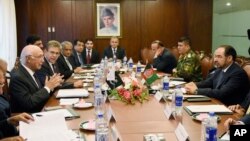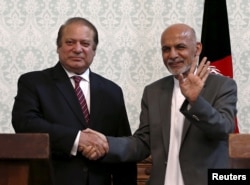Pakistan is set to host a regional conference Wednesday on Afghanistan. The stated goal of countries and organizations participating in the ministerial conference of the so-called ‘Heart of Asia/Istanbul Process’ seek a sustained and effective political dialogue to enhance regional counterterrorism and economic cooperation in Afghanistan.
The latest meeting, however, comes at a time when traditionally uneasy relations between Afghanistan and Pakistan are again marred by deep suspicions and mistrust after a period of improvement in the first half of the year.
The Taliban has expanded its insurgent activities in Afghanistan this year to areas that were considered relatively peaceful during the 14-year-old war, again prompting accusations by some Afghan officials that the group is being secretly backed by Pakistan.
Relations have worsened to the point that there were suggestions that Afghan President Ashraf Ghani might decide against traveling to Islamabad for the summit. But on Monday, top Pakistani and Afghan officials confirmed Ghani will attend.
Speaking in Kabul, the Afghan president said he is going to Islamabad because “this is not Pakistan’s conference, this is Afghanistan’s conference.”
Ghani-Sharif meeting planned
Pakistan’s top foreign policy advisor, Sartaj Aziz, told reporters the Afghan president will also hold a bilateral meeting with Prime Minister Nawaz Sharif and the two will discuss the long-troubled peace talks between Kabul and the Afghan Taliban.
Aziz said that all international stakeholders have been emphasizing the insurgency in Afghanistan cannot be ended without peace negotiations. He added that discussions between Sharif and Ghani will essentially determine “how and at what grounds” Afghan peace and reconciliation talks be initiated.
The United States and China, key partners in the Heart of Asia process, have been pushing both neighboring countries to jointly work for Afghan peace. Ahead of the Islamabad meeting, U.S. special envoy for Afghanistan and Pakistan Richard Olson reiterated Washington’s call for building mutual trust.
“Stability in this region is crucial and the upcoming Heart of Asia Ministerial [conference] is an example of efforts to deepen regional integration to lead to greater peace, security and economic growth in the area. We think this is an excellent opportunity for Afghanistan to play a leading role in developing regional cooperation, particularly in the field of counterterrorism,” Olson said.
For his part, President Ghani complains that Pakistan has not reciprocated the steps he took in reaching out to Pakistan to help end the Taliban insurgency – and the domestic political pressure he endured because of it.
Continued suspicions
Speaking in Germany during his visit to the country last week, Ghani reiterated concerns the Taliban insurgency is being supported from Pakistan.
“Pakistan has been in an undeclared state of hostilities with Afghanistan for the past 14 years, some would say 40 years… The primary peace from our judgement is to make sure that the government of Pakistan engages with us fundamentally regarding the commonality of (the terrorism) threat, and then we can forge," he said.
Ghani also questioned the outcome of any future peace talks with the Afghan Taliban, citing divisions within the insurgency after the death of its longtime leader, Mullah Omar.
“There is no such thing as the Taliban. There are groups of them and competition among them. But it is important to understand that there are inner struggles and it is important to recognize as to what are the outcomes regarding peace,” Ghani said.
The Taliban dismisses as propaganda by the Afghan intelligence agency reports of rifts in the insurgency under its new leader, Mullah Akhtar Mansour.
The Islamist group on Saturday released a voice message of Mansour to prove he is safe and alive. The audio message came days after Afghan officials alleged infighting during a meeting of Taliban commanders in neighboring Pakistan fatally wounded Mansour.












